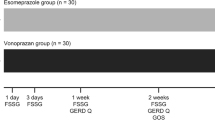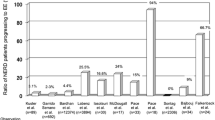Abstract
Introduction
The aim of this study was to assess the efficacy and safety of esomeprazole 40 mg once daily (q.d.) in healing reflux oesophagitis at 4 and 8 weeks, and the efficacy of esomeprazole 20 mg q.d. for 12 weeks in the maintenance of remission.
Methods
A total of 235 patients with endoscopically proven reflux oesophagitis were enrolled in this study, which consisted of two phases (healing and maintenance therapy). Patients who showed complete endoscopic and symptomatic healing at the end of 4 or 8 weeks were switched to maintenance treatment with esomeprazole 20 mg q.d. for 12 weeks. The primary efficacy endpoint was healing of reflux oesophagitis at week 8. Secondary assessments included the proportion of patients with symptomatic relapse in the maintenance phase.
Results
At the end of week 8, 88% (95% life-table confidence intervals [CI]: 84%, 92%) of patients were healed endoscopically and 90.6% of the patients were asymptomatic. Patient age, gender and Helicobacter pylori status had no effect on the efficacy of treatment. During the 12-week maintenance treatment phase, symptomatic relapse ratios were 0.5%, 2.2%, and 0%, for the first, second, and third 4-week periods, respectively. The proportions of patients satisfied with treatment were 95% and 99.4% at the end of acute and maintenance treatment, respectively. The most common adverse effects were headache, upper respiratory tract infection and abdominal pain.
Conclusions
Esomeprazole is effective in the healing of reflux oesophagitis, the resolution of heartburn, and in maintaining symptomatic remission. The effectiveness of esomeprazole in patients with gastroesophageal reflux disease is not affected by the presence of H. pylori.
Similar content being viewed by others
References
Spechler SJ. Epidemiology and natural history of gastro-esophageal reflux disease. Digestion. 1992;51(suppl):24–49.
Orlando RC. Pathogenesis of reflux esophagitis and Barrett’s esophagus. Med Clin North Am. 2005;89:219–241.
Holloway RH, Dent J, Narielvala F, Mackinnon AM. Relation between oesophageal acid exposure and healing of oesophagitis with omeprazole in patients with severe reflux oesophagitis. Gut. 1996;38:649–654.
Johansson KE, Ask P, Boeryd B, Fransson SG, Tibbling L. Oesophagitis, signs of reflux, and gastric acid secretion in patients with symptoms of gastro-oesophageal reflux disease. Scand J Gastroenterol. 1986;21:837–847.
Katz PO, Ginsberg GG, Hoyle PE, Sostek MB, Monyak JT, Silberg DG. Relationship between intragastric acid control and healing status in the treatment of moderate to severe erosive oesophagitis. Aliment Pharmacol Ther. 2007;25:617–628.
Chiba N, De Gara CJ, Wilkinson JM, Hunt RH. Speed of healing and symptom relief in grade 2 to 4 gastroesophageal reflux disease: a meta-analysis. Gastroenterology. 1997;112:1798–1810.
Hassan-Alin M, Andersson T, Bredberg E, Röhss K. Pharmacokinetics of esomeprazole after oral and intravenous administration of single and repeated doses to healthy subjects. Eur J Clin Pharmacol. 2000;56:665–670.
Lind T, Rydberg L, Kylebäck A, et al. Esomeprazole provides improved acid control vs. omeprazole in patients with symptoms of gastro-oesophageal reflux disease. Aliment Pharmacol Ther. 2000;14:861–867.
Miner PJr, Katz PO, Chen Y, Sostek M. Gastric acid control with esomeprazole, lansoprazole, omeprazole, pantoprazole and rabeprazole: a five-way crossover study. Am J Gastroenterol. 2003;98:2616–2620.
Röhss K, Lind T, Wilder-Smith C. Esomeprazole 40 mg provides more effective intragastric acid control than lansoprazole 30 mg, omeprazole 20 mg, pantoprazole 40 mg and rabeprazole 20 mg. in patients with gastroesophageal reflux symptoms. Eur J Clin Pharmacol. 2004;60:531–539.
Kahrilas P, Falk GW, Johnson DA, et al. Esomeprazole improves healing and symptom resolution as compared with omeprazole in reflux oesophagitis patients: a randomized controlled trial. Aliment Pharmacol Ther. 2000;14:1249–1258.
Richter JE, Kahrilas PJ, Johanson J, et al. Efficacy and safety of esomeprazole compared with omeprazole in GERD patients with erosive esophagitis: a randomized controlled trial. Am J Gastroenterol. 2001;96:656–665.
Castell DO, Kahrilas PJ, Richter JE, et al. Esomeprazole (40 mg) compared with lansoprazole (30 mg) in the treatment of erosive esophagitis. Am J Gastroenterol. 2002;97:575–583.
Labenz J, Armstrong D, Lauritsen K, et al. A randomized comparative study of esomeprazole 40 mg versus pantoprazole 40 mg for healing erosive oesophagitis: the EXPO study. Aliment Pharmacol Ther. 2005;21:739–746.
Johnson DA, Benjamin SB, Vakil NB, et al. Esomeprazole once daily for 6 months is effective therapy for maintenance of healing of erosive esophagitis and control of GERD symptoms. Am J Gastroenterol. 2001;96:27–34.
Vakil NB, Shaker R, Johnson DA, et al. The new proton pump inhibitor esomeprazole is effective as a maintenance therapy in GERD patients with healed erosive esophagitis. A 6-month, randomized, double-blind, placebo-controlled study of efficacy and safety. Aliment Pharmacol Ther. 2001;15:926–935.
Talley NJ, Venables T, Green J, et al. Esomeprazole 40 mg and 20 mg is efficacious in the long-term management of patients with endoscopy-negative GERD: a placebo controlled trial of ‘on-demand’ therapy for 6 months. Eur J Gastroenterol Hepatol. 2002;14:857–863.
Gralnek IM, Dulai GS, Fennerty MB, Spiegel BM. Esomeprazole versus other proton pump inhibitors in erosive esophagitis: a meta-analysis of randomized clinical trials. Clin Gastroenterol Hepatol. 2006;4:1452–1458.
Edwards SJ, Lind T, Lundell L. Systematic review: proton pump inhibitors (PPIs) for the healing of reflux oesophagitis — a comparison of esomeprazole with other PPIs. Aliment Pharmacol Ther. 2006;24:743–750.
Lundell LR, Dent J, Bennett JR, et al. Endoscopic assessment of oesophagitis: clinical and functional correlates and further validation of the Los Angeles classification. Gut. 1999;45:172–180.
Fass R. Erosive esophagitis and nonerosive reflux disease (NERD): comparison of epidemiologic, physiologic and therapeutic characteristics. J Clin Gastroenterol. 2007;41:131–137.
Rai A, Orlando RC. Gastroesophageal reflux disease. Curr Opin Gastroenterol. 2001;17:359–365.
Thomson AB, Chiba N, Armstrong D, Tougas G, Hunt RH. The Second Canadian Gastroesophageal Reflux Disease Consensus: moving forward to new concepts. Can J Gastroenterol. 1998;12:551–556.
Chiba N. Proton pump inhibitors in acute healing and maintenance of erosive or worse esophagitis: a systemic overview. Can J Gastroenterol. 1997;1(suppl B):66B–73B.
Johnson DA, Vakil NB, Hwang C, Levine JG. Absence of symptoms in erosive esophagitis (EE) in patients treated with esomeprazole is a highly reliable indicator of healing. Gastroenterology. 2001;120:A439.
Johnson DA, Vakil NB, Richter JE, Zuckerman S, Levine JG, Skammer W. Sustained heartburn resolution during the first 4 weeks of PPI therapy predicts subsequent healing in GERD patients with erosive esophagitis. Gut. 2002;50(suppl III):A166.
Goh KL, Benamouzig R, Sander P, Schwan T. Efficacy of pantoprazole 20 mg daily compared with esomeprazole 20 mg daily in the maintenance of healed gastroesophageal reflux disease: a randomized, double-blind comparative trial — the EMANCIPATE study. Eur J Gastroenterol Hepatol. 2007;19:205–211.
Labenz J, Armstrong D, Lauritsen K, et al. Esomeprazole 20 mg vs. pantoprazole 20 mg for maintenance therapy of healed erosive oesophagitis: results from the EXPO study. Aliment Pharmacol Ther. 2005;22:803–811.
Devault KR, Johanson JF, Johnson DA, Liu S, Sostek MB. Maintenance of healed erosive esophagitis: a randomized sixmonth comparison of esomeprazole twenty milligrams with lansoprazole fifteen milligrams. Clin Gastroenterol Hepatol. 2006;4:852–859.
Lauritsen K, Devière J, Bigard MA, et al. Esomeprazole 20 mg and lansoprazole 15 mg in maintaining healed reflux oesophagitis: Metropole study results. Aliment Pharmacol Ther. 2003;17:333–341.
Richter JE, Falk GW, Vaezi MF. Helicobacter pylori and gastroesophageal reflux disease: the bug may not be all bad. Am J Gastroenterol. 1998;93:1800–1802.
Raghunath A, Hungin AP, Wooff D, Childs S. Prevalence of Helicobacter pylori in patients with gastro-oesophageal reflux disease: systematic review. BMJ. 2003;326:737.
Us D, Hasçelik G. Seroprevalance of Helicobacter pylori infection in an asymptomatic Turkish population. J Infect. 1998;37:148–150.
Lundell L. Gastro-oesophageal reflux disease and Helicobacter pylori or gastrooesophageal reflux disease from Helicobacter pylori? Eur J Gastroenterol Hepatol. 2001;13:23–27.
Verdú EF, Armstrong D, Fraser R, et al. Effect of Helicobacter pylori status on intragastric pH during treatment with omeprazole. Gut. 1995;36:539–543.
Van Herwaarden MA, Samsom M, Van Nispen CHM, Mulder PGH, Smout AJPM. The effect of Helicobacter pylori eradication on intragastric pH during dosing with lansoprazole or ranitidine. Aliment Pharmacol Ther. 1999;13:731–740.
Holtmann G, Cain C, Malfertheiner P. Gastric Helicobacter pylori infection accelerates healing of reflux esophagitis during treatment with the proton pump inhibitor pantoprazole. Gastroenterology. 1999;117:11–16.
Vakil N, Kahrilas P, Magner D, Skammer W, Levine J. Does baseline Hp status impact erosive oesophagitis (EE) healing rates? Am J Gastroenterol. 2000;95:2438–2439.
Author information
Authors and Affiliations
Corresponding author
Rights and permissions
About this article
Cite this article
Atug, O., Giral, A., Kalayci, C. et al. Esomeprazole in acute and maintenance treatment of reflux oesophagitis: a multicentre prospective study. Adv Therapy 25, 552–566 (2008). https://doi.org/10.1007/s12325-008-0071-5
Published:
Issue Date:
DOI: https://doi.org/10.1007/s12325-008-0071-5




